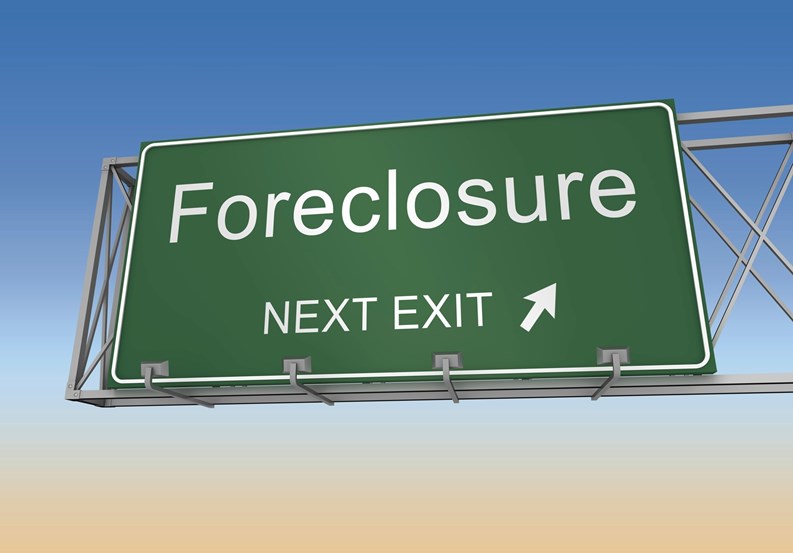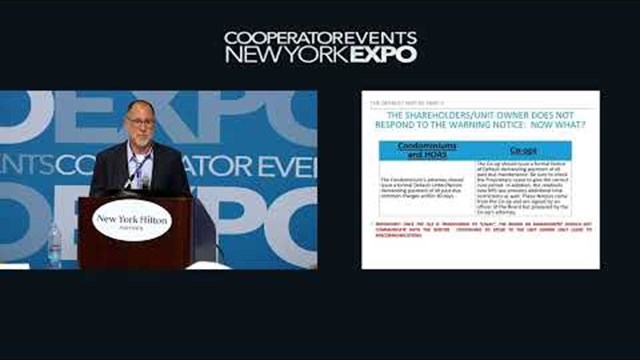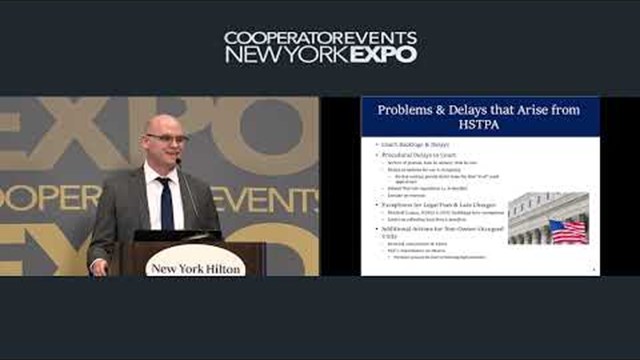The first of the month rolls around and it’s time to pay the bills that keep your building operational. Repairs might need to be made, staff salaries paid, maintenance done to keep all the common elements running, and supplies reordered. The consistent influx of funds from residents' monthly fees is what makes all of this possible, and keeps a building or HOA functional and solvent from month to month. But sometimes—not often, but sometimes—residents don't hold up their end of the condo-living contract, and fall into arrears.
Reasons for Nonpayment
“The overwhelming favorite is ‘we don’t have the money,'” says Bruce Cholst, an attorney shareholder with the law firm of Anderson Kill PC in Manhattan. “Or owners will sometimes say they don’t like the decisions the board is making, or don’t agree with how the money is spent, or have problems in their unit that the condo won’t fix, therefore they’re withholding charges, but there’s no legal basis for that. When it comes to a co-op, they assert that the board has responsibilities to make repairs under the proprietary lease and therefore the law gives them the right under the warranty of habitability to withhold maintenance, which is an often sited reason in co-ops.”
Andrew Wagner, another shareholder with Anderson Kill P.C. adds, “As the proprietary lessee in a co-op, you are legally a tenant and therefore the warranty of habitability that applies to all tenants in New York State applies to cooperative shareholders. The difference is that unlike a regular rental tenant, a co-op shareholder is typically responsible for conditions in their own apartments, while the co-op is only obligated to fix condition caused by outside sources. So the warranty of habitability is much more limited in a co-op, but it is a basis to withhold maintenance fees under limited circumstances.”
Pay Up
So outside of the warranty of habitability, while there are very few legal reasons a resident can use as an excuse as to why they did not pay their monthly dues, the board doesn’t have to begin collections right away. Sandy Adelsberg, a sales and leasing agent from Veritas Property Management, LLC, explains. “Every well run co-op or condo board should have a policy in place of what they think is a reasonable time before initiating collections. But we recommend no more than two months. So if they go into the third month, they go into legal. But they're given notice before; it's not all of a sudden that it appears. You are trying, even the first month, to notify them that they owe, and send it in, and the following month the same.”
Cholst though, notes that acting quickly does have its benefits, particularly in condos. “Certainly in a condo you should do it very quickly, but if you’re filing a lien and commencing a foreclosure on that lien, it just adds up very quickly. The priority is against a condo board in terms of recovering arrears, while in a co-op the board takes priority over the bank. I advise my clients to send a letter after 60 days saying that they’re going to start a lien and initiate foreclosure proceedings if they don’t get paid in 30 days. On day 31, they can go ahead and file the lien, and give the resident another chance. But the important thing is to adhere to those deadlines because that’s how you keep credibility.”
So while a co-op board can afford to wait a little bit to begin collections, a condo board should start moving quickly so they can stay ahead of the bank.
Working with Residents
This urgency doesn’t mean that a board shouldn’t try and work with residents to avoid unnecessary legal fees and acrimony, however. Adelsberg notes, “The board can contact the resident and see if they can work out a stipulation...without having to go to court, and explain to them that it's best to try to work out a reasonable payback period. Once you've come to an agreement, it's crucial to put it in writing and have the resident sign it. The resident must understand that if they don't stick by the agreement, you will take it to court, and then they'll be responsible for the legal bills as well. So you're trying to help them avoid legal bills. Another thing a building might do is say, ‘Well, if you can work out an agreement with us in the stipulation and stick to it, we can delete some of your late fees, or all of your late fees, and not charge you more late fees because you're still running a balance.’ ”
Wagner adds that “Usually if they just need a couple of months to get current, it’s not worth it to start litigation, but if they need six months, then it’s a good idea to bring the case to housing court with the understanding that you can give them a payment plan in court for six months or even a year, but you’re allowed to get a judgement and a warrant that will be stayed so long as they keep up with their payment obligation." That way, so long as the payments continue, there is no danger for the unit owner but if they stop paying on schedule, the board will be able to move quickly from there.
Cholst sums up the payment plan option: “You can’t give away the money, and you can’t excuse it, but you can give them time to pay it.”
Going to Court
If a payment plan fails, that means it’s time to get the lawyers involved and start legal proceedings. “The building is entitled to start a foreclosure against them, which would be to their advantage to do," says Adelsberg. "And they also have to notify the bank...that the shareholder is in default. Oftentimes, the bank steps in and starts paying."
Wagner notes that “With a co-op, you’re allowed to bring a non-payment proceeding into housing court, which is a much more expedited process than bringing a foreclosure action and because you’re in front of the bank in priority, you get a much quicker result. So you should start [housing court filing] maybe in the third month of arrears. Usually the managing agent will send a warning notice before sending it to legal.”
Though condos do need to go through the longer foreclosure process, Deborah Koplovitz, also a shareholder at Anderson Kill P.C., explains, “If a condo unit owner doesn’t get caught up, then a lien is filed. The next step is to foreclose on that lien in the Supreme Court—this is very similar to a mortgage foreclosure process. The foreclosure process involves a number of steps, and what happens depends on if the unit owner has council.”
Koplovitz continues; “Boards should have a referee appointed to calculate the amounts owed. After that, there will be a judgment of foreclosure and sale. That judgment allows you to have the referee sell the apartment at an auction, typically held at a courthouse. Prior to the auction, the judge will set forth where he wants you to publish notice of the auction, and for how long that notice must appear. Once it's published for that period of time, the unit will go up for sale. The winning bidder normally has 30 days to close the sale.”
A Long Process
Cholst does not that “In recent years, especially after the 2008 downturn, it’s much harder to complete a foreclosure. There’s been a real turn against the banks and against condo associations, and judges are tending to hold the boards and the banks to the highest standards of technical compliance with all the requirements.” As a result, it’s very important for boards seeking foreclosure to be sure that all their ducks are in a row before starting the proceedings as, according to Cholst, “A foreclosure action can take several years from beginning to end.”
In a co-op, once the judgment is made, then comes the eviction process, which is a little more straightforward. “If the shareholder is actually evicted, we would then schedule a public auction of the apartment, and at the closing the co-op gets paid first, then the bank, then any subordinates, and then the shareholder gets paid with any surplus monies,” says Wagner.
Wagner continues, adding that “The case is either settled by stipulation, which is a settlement approved by the judge authorizing you to get a judgment of possession. If the shareholder defaults under the terms of the stipulation, you can go ahead and perform the eviction; if it’s a judgment after trial it’s the same thing basically. Regardless of how you get the judgement, you can then go ahead and requisition a warrant, which takes a few weeks. At that point a marshall serves a mandatory 6 business day notice that the eviction will take place. When the eviction takes place, whoever is physically in the apartment will be removed, any property in the apartment is inventoried, and the co-op will have the option of keeping the property in the apartment for 30 days. If it’s not retrieved, they can give the shareholder reasonable access to get their stuff out of there. They could also move all their property into a storage facility, but I advise against this because they could be accused of property damage. “
It's reasonable to say that nobody wants to fall into arrears—nor does a board want to launch legal proceedings against a neighbor, even if they have good reason to do so. But when it comes to upholding a board's fiduciary duty, sometimes these tough choices must be made, and made timely in order to defend the best interests of the building or association as a whole. By knowing the steps of the process and having competent, experienced legal counsel on your side, your condo or co-op can make fair, legally sound decisions about how to handle it when it does happen.
John Zurz is a staff writer and reporter for The Cooperator.










Leave a Comment